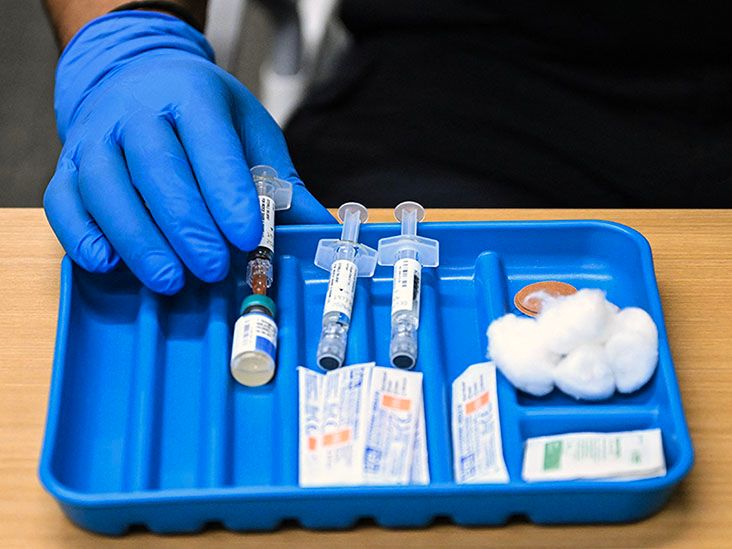COVID-19 vaccines are safe for people with multiple sclerosis (MS). But some MS medications could reduce the ability of the vaccines to protect against COVID-19. Still, experts conclude that the benefits of vaccination outweigh any risks.
Anyone with concerns about the safety of a COVID-19 vaccine should speak with a healthcare professional.
Having a lowers the overall risk of the disease. Being vaccinated also protects others, in the community and the population at large, and it means facing fewer restrictions on daily activities.
Keep reading to learn about the safety and effectiveness of COVID-19 vaccines for people with MS.
Coronavirus resources
For more advice on COVID-19 prevention and treatment, visit our coronavirus hub.

The National Multiple Sclerosis Society recommends that people with MS get vaccinated against COVID-19.
COVID-19 can be life threatening for anyone, but some MS-associated factors can increase the risk of a more serious outcome. These factors include, for example, certain MS treatments and the extent of disability.
The National Multiple Sclerosis Society formed a group of researchers and medical experts to review the evidence and safety of COVID-19 vaccines for people with MS.
The review concluded that COVID-19 vaccines are safe for people with MS and do not have harmful interactions with MS medications.
COVID-19 can have severe consequences, and allowing the virus to continue spreading especially endangers the lives of people with vulnerabilities to infections.
There is currently no evidence that COVID-19 vaccinations cause an MS relapse or have long-term implications for how the disease progresses.
Side effects in the general population
Any medication can cause side effects, and COVID-19 vaccines can cause mild, transient ones. This is normal, and it results from the body’s process of developing immunity.
The
- pain, redness, or swelling around the site of the injection
- headache
- muscle ache
- tiredness
- fever
- chills
- nausea
Side effects in people with MS
If a person with MS develops a fever as a vaccine side effect, it could temporarily worsen MS symptoms.
More specifically, a
A study from the same year in 555 people with MS found that pain around the injection site, tiredness, and headaches were the most common side effects of the Pfizer-BioNTech vaccine.
The researchers found no increase in the risk of MS relapse after 20 and 38 days in participants who had received the vaccine, compared with those who had not.
Coronavirus data
All data and statistics are based on publicly available data at the time of publication. Some information may be out of date. Visit our coronavirus hub for the most recent information on COVID-19.
Some MS treatments may reduce the effectiveness of the COVID-19 vaccine due to how they change the immune system.
A
The researchers specify that the following treatments may limit how well COVID-19 vaccines work:
- ocrelizumab (Ocrevus)
- rituximab (Rituxan)
- ofatumumab (Arzerra)
- alemtuzumab (Lemtrada)
- cladribine (Mavenclad)
MS treatments that should not influence the effectiveness of these vaccines include:
- interferon beta (Avonex, Rebif)
- glatiramer acetate (Copaxone)
- teriflunomide (Aubagio)
- fumarates, such as Tecfidera
- natalizumab (Tysabri)
It is important to note — even vaccines with reduced effectiveness offer a strong defense against COVID-19 for people with MS.
Anyone taking a disease-modifying MS drug, even one that may reduce the effectiveness of COVID-19 vaccines, should continue taking it. Sudden changes to a long-term treatment plan may lead to an MS flare.
It is important for people with MS to discuss how and when to get their COVID-19 vaccine with a doctor.
No evidence suggests that having MS directly increases the risk of developing COVID-19. However, there is very little research in this area.
One
The National Multiple Sclerosis Society reports that people with MS are more likely to develop severe COVID-19 if they have at least one of the following risk factors:
- being older
- being Black or South Asian
- being male
- having a higher level of physical disability
- having obesity
- having other medical conditions, such as high blood pressure
- having progressive MS
- taking certain disease-modifying medications
Having MS is unlikely to increase the risk of adverse effects of the COVID-19 vaccine.
Adverse effects are not the same as side effects. Side effects include a fever, fatigue, and soreness. Adverse effects of the COVID-19 vaccine can include blood clots, myocarditis, and Guillain-Barré syndrome. All are rare.
There is no indication that people with MS have a higher risk of these health issues. But if any concerning symptoms develop, a person should seek emergency medical care.
Three vaccines have been approved for use in the United States: Pfizer-BioNTech, Moderna, and Janssen, also called Johnson & Johnson. There is no evidence that any vaccine is more likely to cause adverse effects in people with MS.
A guide to different COVID-19 vaccines
- The Pfizer vaccine for coronavirus
- Everything to know about the Moderna COVID-19 vaccine
- How does the Sputnik V COVID-19 vaccine work?
- Oxford-AstraZeneca vaccine: What to know about side effects
- Johnson & Johnson COVID-19 vaccine: What are the side effects?
- How does the Sputnik V COVID-19 vaccine work?
- Covaxin COVID-19 vaccine: What to know about side effects
As the
Vaccination lowers the risk of developing this disease. It is a safe way of building immunity against COVID-19 that can last for a long time. Getting the vaccine can also reduce the number of restrictions on daily activities.
In addition, being vaccinated reduces the risk of the virus passing on to other people. Preventing this transmission is critical for protecting vulnerable people from severe illness and death from the disease. Limiting the circulation of the virus may also reduce the likelihood of a new, more dangerous variant developing.
As MS experts confirm, COVID-19 vaccines are safe.
Some people with MS have a higher risk of severe COVID-19, and getting vaccinated may be especially important for these groups, as it can help prevent serious complications.
Some MS treatments that alter the immune system
Speak with a doctor about specific risks associated with COVID-19 and possible interactions with medications.


